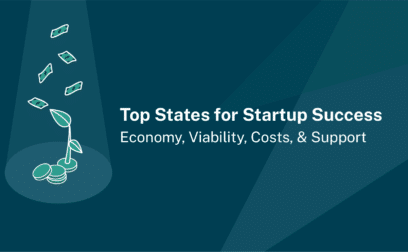TABLE OF CONTENTS
If you’re looking to start a small business in South Dakota, you’ll be pleased to learn that the state was recently ranked as the fourth best for starting a business in the U.S., due in part to a high business survival rate.
One way to ensure your business survives is to find the right funding, which may include a small business loan. Learn more about small business loans in South Dakota, including how to apply and what other options are available.
In South Dakota, small businesses have access to various types of business loans to meet their financial needs. Common types of small business loans available include traditional bank loans, SBA loans and alternative financing options.
Traditional bank loans are usually offered by banks or credit unions, either locally or on a national level. They tend to have varying interest rates and repayment terms, which you may be able to negotiate if you have a strong credit score.
The U.S. Small Business Administration (SBA) provides several loan programs, including 7(a) loans, CDC/504 loans and microloans, which are meant to help small businesses with financing. These loan programs are guaranteed by the federal government, which makes them less risky for lenders.
Alternative lenders and online financing platforms also operate in South Dakota. These alternative financing options may provide faster access to funds and consider lending to borrowers with lower credit scores, but they often come with shorter repayment terms and higher interest rates compared to bank loans.
When considering small business loans in South Dakota, it’s essential for business owners to carefully review the terms, interest rates and eligibility criteria of different options. Consulting with financial advisors or reaching out to local small business development centers can provide additional guidance and support.
Finding a business grant in South Dakota involves a few key steps. It’s important to keep in mind that grant programs are very competitive because they offer your business a lump sum of money that you don’t have to repay. You’ll want to tailor your search to grant programs that you’re most qualified for so you can focus on creating the most appealing application.
Start by researching government and private grant programs that support small businesses in the state. The U.S. Small Business Administration (SBA) and state economic development agencies are good starting points. Additionally, explore local chambers of commerce, business associations, and nonprofit organizations, as they may offer information on available grants.
Consider reaching out to the South Dakota Governor’s Office of Economic Development for guidance on state-specific grant opportunities. Networking with other local business owners and attending business events can also provide insights into grants that may not be widely advertised. Pay attention to eligibility criteria, application requirements and deadlines for each grant program.
Lastly, stay informed about updates and new opportunities, as grant programs may evolve over time. Regularly check the websites of relevant organizations and government agencies for the latest information on business grants in South Dakota.
To apply for a small business loan in South Dakota, you can follow these general steps:
Remember, each lender may have its own specific procedures and requirements, so it’s essential to communicate with them directly and seek clarification if needed throughout the application process.
There are several alternative financing options for small businesses. These options can be valuable for businesses that may not qualify for traditional bank loans or prefer different terms. Here are some common alternatives:
Each financing option has its pros and cons, and the suitability depends on factors like the business’s financial situation, the purpose of the loan and the owner’s preferences. It’s a good idea for small business owners to carefully evaluate these options and choose the one that fits their needs and financial goals the best.
Most lenders will use your credit score to determine how creditworthy you are, meaning how likely you are to be able to repay the loan. The credit score required for a small business loan can vary depending on the lender and the type of loan.
Traditional banks often prefer higher credit scores, typically in the range of 680 and above. However, alternative lenders, such as online lenders, may be more flexible and consider applicants with lower credit scores, sometimes as low as 550. Higher credit scores usually mean better interest rates and fewer fees, regardless of which lender you apply to.
It’s important to note that while credit score is a significant factor, lenders also consider other aspects of your business and personal financial history. These may include your business’s revenue, time in operation, cash flow and debt-to-income ratio. Downpayments and collateral may also help your chances of securing a business loan.
Ultimately, a higher credit score generally improves your chances of qualifying for a loan and securing more favorable terms. However, even with a lower credit score, you may still find lenders willing to work with you, but potentially at higher interest rates or with more stringent terms.
Interest rates on business loans in South Dakota can vary based on several factors, like:
For traditional bank loans, interest rates may range from around 7% to 9%, depending on the specifics of the loan. SBA loans, which are tied to the U.S. Prime Rate, have ranged from 11.5% to 16.5% recently, depending on the loan program and the amount of the loan.
Alternative lenders, such as online lenders or peer-to-peer lending platforms, may offer loans with higher interest rates, sometimes ranging from 10% to 30% or more. These lenders may have less strict approval criteria, making them accessible to businesses with varying credit profiles.
It’s important for business owners in South Dakota to compare offers from different lenders to find the most favorable terms for their specific situation.
The time it takes to receive funds from a small business loan can vary based on several factors. Traditional bank loans often involve a more extended application and approval process, and it may take several weeks to months before funds are disbursed. This is due to the thorough underwriting and documentation requirements.
SBA loans can take anywhere from several weeks to six months to fund due to their thorough application review process. Also, SBA loans are extremely popular with small businesses, which means there are even more applications for the lenders to review.
On the other hand, online lenders and alternative financing options tend to have a quicker turnaround. Some online lenders can provide approval within a few days, and funds may be disbursed shortly after approval, often within a week or two.
The specific time frame depends on the complexity of the loan, the lender’s processes and the responsiveness of the borrower in providing required documentation. It’s important for business owners to learn about the expected timeline when exploring different loan options and to be prepared with the necessary documentation to speed up the process.
Finding the best funding for your small business in South Dakota involves a comprehensive approach. Start by assessing your business’s financial needs, including how much money you need and how you’ll use the funds. Next, explore different financing options such as traditional bank loans, online lenders, SBA loans and local economic development programs.
Research and compare interest rates, terms and fees associated with each option. Consider your business’s creditworthiness, as this will impact the types of loans and interest rates available to you.
Networking with other local businesses and business owners can also lead to valuable insights and recommendations for financing options. Make sure that you review the terms and conditions of any loan offer, considering not only the interest rate but also factors like repayment terms, collateral requirements, and any potential hidden fees.
Lastly, consulting with financial advisors or professionals with expertise in small business financing can provide personalized guidance based on your specific circumstances. Taking the time to research and carefully evaluate your options will help you find the funding solution that best fits your business goals and financial needs in South Dakota.
If you’re ready to find financing for your small business in South Dakota, Swoop offers wide range of funding options. We also provide assistance and helpful guidance in securing the necessary funds for your business. Get started today.
Daire made it happen! There is no doubt that Swoop sped up the process and found lenders that worked to our time scale rather than the other way round
Hocque Figureoa
Joint owner, F45 Virginia
Swoop was actually very helpful in helping us get our initial fundraising in place. Swoop was able to connect us with investors, with grant financing options and debt financing options.
Viler Lika
Founder, SingleKey
Pedja was amazing. Super supportive, understanding of our needs and wasn't pushy at all. We've been going back and forth with Swoop for over a year inquiring about different financing options and they were patient until we were ready!
Chris Skeates
F45 Multi-studio owner
Join the 95,000+ businesses just like yours getting the Swoop newsletter.
Free. No spam. Opt out whenever you like.
Kingfisher Way, Silverlink Business Park, Newcastle upon Tyne, NE28 9NX, UK
View in Google Maps35 Bull Street, Lewis Building, Birmingham B4 6AF, UK
View in Google MapsAberystwyth Innovation and Enterprise Campus
Gogerddan Campus
Aberystwyth University
Ceredigion
SY23 3EE
Dogpatch Labs, The CHQ Building, Custom House Quay, Dublin, Ireland
View in Google MapsSuite 801, Level 8, 84 Pitt Street, Sydney, NSW 2000, Australia
View in Google Maps43 W 23rd St, New York, NY 10010, United States
View in Google Maps21 Dreyer Street, Cape Town, South Africa, 7708
View in Google MapsClever finance tips and the latest news
Delivered to your inbox monthly
Join the 95,000+ businesses just like yours getting the Swoop newsletter. Free. No spam. Opt out whenever you like.




